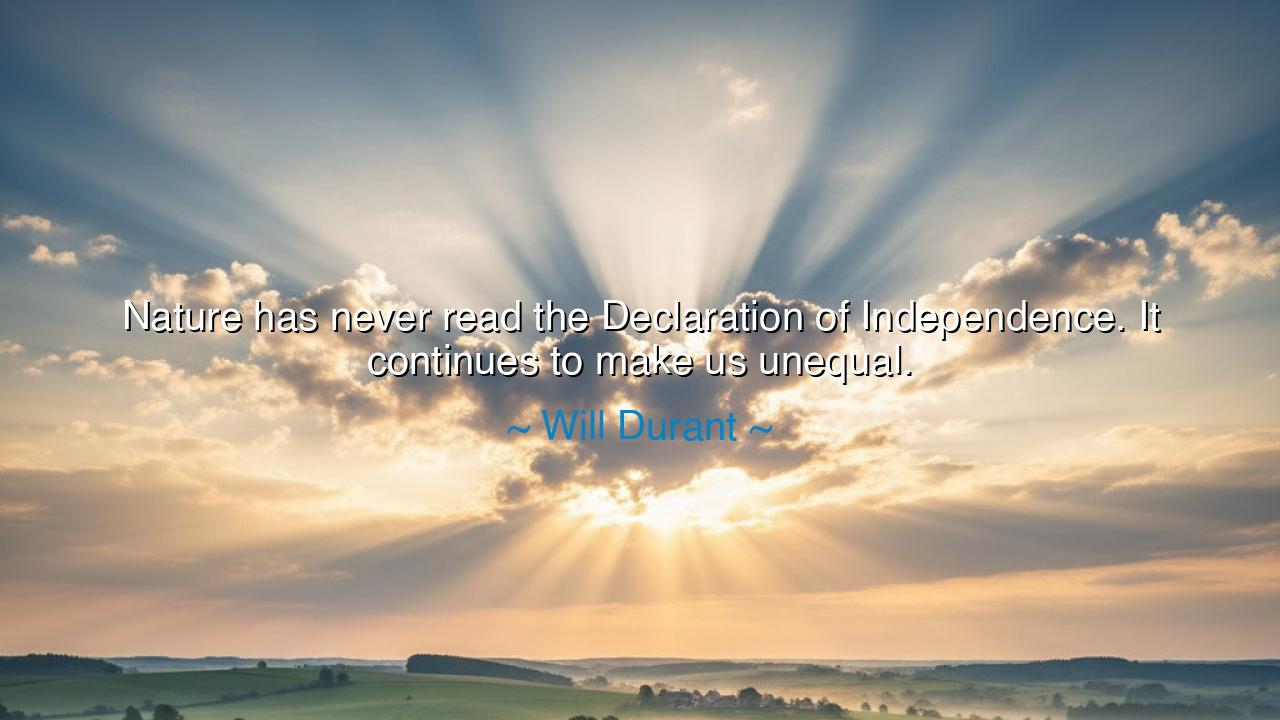
Nature has never read the Declaration of Independence. It
Nature has never read the Declaration of Independence. It continues to make us unequal.






The words of Will Durant, philosopher, historian, and chronicler of civilization’s long ascent, strike with the serene yet sobering force of truth: “Nature has never read the Declaration of Independence. It continues to make us unequal.” In this single sentence, Durant reveals the eternal tension between the ideals of man and the realities of the world he inhabits. His words remind us that while human beings may dream of equality, Nature itself is indifferent to such visions. It gives to one strength and to another frailty, to one beauty and to another plainness, to one intellect and to another simplicity. The earth and the heavens do not bend to the moral laws of man. They follow their own rhythm, older than civilization, older even than hope.
To understand the origin of this quote, one must understand the soul of Will Durant himself—a man who spent his life studying the rise and fall of empires, the virtues and follies of humankind. Together with his wife, Ariel Durant, he wrote The Story of Civilization, a monumental reflection on humanity’s quest for meaning and order. Having seen both the splendor and savagery of the human race, Durant came to understand that the Declaration of Independence, though noble in its proclamation that “all men are created equal,” was a human aspiration, not a natural law. He saw that Nature, impartial and relentless, cares nothing for our philosophies. The lion and the lamb are not equal; neither are the wise and the foolish, the gifted and the ordinary. And yet, it is precisely because Nature is unequal that mankind must strive to create justice—to lift where the world has not been kind.
In Durant’s eyes, inequality was not an evil in itself, but a condition of existence. It is the soil from which greatness often grows, the challenge that drives men to strive and nations to progress. But when men forget that Nature’s inequalities are not moral judgments—when they take advantage of the weak or use their strength for oppression—they transform natural difference into social cruelty. The philosopher’s warning is this: the inequalities of Nature are inevitable, but the inequalities of injustice are man-made. The former are challenges; the latter are sins. True civilization, he taught, is measured not by the absence of inequality, but by how we respond to it—with mercy, fairness, and wisdom.
Consider the story of Abraham Lincoln, born in poverty in a log cabin in Kentucky. Nature did not favor him with wealth, beauty, or privilege. He was tall and awkward, his face weathered before its time, his education scarce. Yet within him burned the quiet fire of perseverance. Through toil, humility, and intellect, he rose to the highest office of the land. It was he who gave new meaning to the very Declaration of Independence Durant invoked—transforming its words from ideal to reality for millions enslaved. Lincoln’s life proves that though Nature makes us unequal, the human spirit, armed with character and compassion, can rise above those bounds. The inequality of birth need not be the inequality of destiny.
In the tone of the ancients, we may say: Nature is the great sculptor, but man is the chisel. The winds of life carve each person differently—some into mountains, some into stones. Yet within all is the same divine spark that yearns to shape itself into something worthy. To envy another’s form is to misunderstand one’s own. The wise do not curse Nature’s inequalities; they seek to turn them into harmony, as a musician turns discord into melody. Durant’s insight reminds us that equality before the law must be balanced with acceptance of the inequalities of life. For if we deny that differences exist, we deny the truth; but if we accept them without compassion, we deny our humanity.
Durant’s words also carry a deeper warning about pride. Modern man, he suggests, often mistakes his ideals for laws of the universe. He believes that his declarations can bend Nature to his will, that his vision of equality can erase the forces that govern existence. But Nature, silent and enduring, does not yield. The mountains do not lower themselves for the plains; the sun does not shine equally upon every valley. The wise learn not to rebel against these facts, but to work within them—to build justice, compassion, and opportunity despite them. Civilization, in Durant’s teaching, is not the denial of Nature, but the refinement of it.
The lesson of Durant’s words is timeless: we must walk with both humility and resolve. We must understand that equality is a human dream, born from compassion, not from the laws of earth or sky. Nature makes us different; justice teaches us to treat those differences with fairness and respect. True progress comes not from pretending that all are equal in ability, but from ensuring that all are equal in dignity, in rights, and in the opportunity to rise.
And so, the practical path is this: accept Nature’s inequality but resist the inequality of cruelty. Do not envy what others have been given, but cultivate what you have been granted. Honor those who are weaker by helping them rise, and respect those who are stronger by learning from their excellence. Let equality be not a denial of difference, but a devotion to balance. As Will Durant teaches, Nature may not have read the Declaration of Independence, but mankind has—and in our power to love, to build, and to choose justice, we fulfill its promise. For though Nature makes us unequal, it is the heart of man that makes us free.






AAdministratorAdministrator
Welcome, honored guests. Please leave a comment, we will respond soon